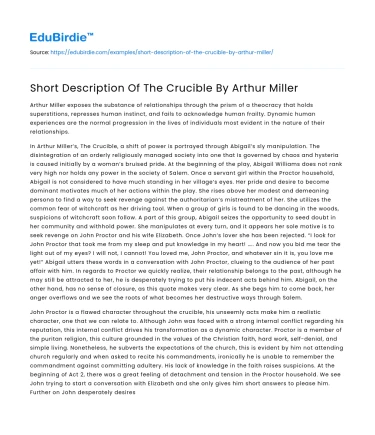Arthur Miller exposes the substance of relationships through the prism of a theocracy that holds superstitions, represses human instinct, and fails to acknowledge human frailty. Dynamic human experiences are the normal progression in the lives of individuals most evident in the nature of their relationships.
In Arthur Miller’s, The Crucible, a shift of power is portrayed through Abigail’s sly manipulation. The disintegration of an orderly religiously managed society into one that Is governed by chaos and hysteria is caused initially by a woman’s bruised pride. At the beginning of the play, Abigail Williams does not rank very high nor holds any power in the society of Salem. Once a servant girl within the Proctor household, Abigail is not considered to have much standing in her village’s eyes. Her pride and desire to become dominant motivates much of her actions within the play. She rises above her modest and demeaning persona to find a way to seek revenge against the authoritarian’s mistreatment of her. She utilizes the common fear of witchcraft as her driving tool. When a group of girls is found to be dancing in the woods, suspicions of witchcraft soon follow. A part of this group, Abigail seizes the opportunity to seed doubt in her community and withhold power. She manipulates at every turn, and it appears her sole motive is to seek revenge on John Proctor and his wife Elizabeth. Once John’s lover she has been rejected. “I look for John Proctor that took me from my sleep and put knowledge in my heart! ….. And now you bid me tear the light out of my eyes? I will not, I cannot! You loved me, John Proctor, and whatever sin it is, you love me yet!” Abigail utters these words in a conversation with John Proctor, clueing to the audience of her past affair with him. In regards to Proctor we quickly realize, their relationship belongs to the past, although he may still be attracted to her, he is desperately trying to put his indecent acts behind him. Abigail, on the other hand, has no sense of closure, as this quote makes very clear. As she begs him to come back, her anger overflows and we see the roots of what becomes her destructive ways through Salem.
Save your time!
We can take care of your essay
- Proper editing and formatting
- Free revision, title page, and bibliography
- Flexible prices and money-back guarantee
John Proctor is a flawed character throughout the crucible, his unseemly acts make him a realistic character, one that we can relate to. Although John was faced with a strong internal conflict regarding his reputation, this internal conflict drives his transformation as a dynamic character. Proctor is a member of the puritan religion, this culture grounded in the values of the Christian faith, hard work, self-denial, and simple living. Nonetheless, he subverts the expectations of the church, this is evident by him not attending church regularly and when asked to recite his commandments, ironically he is unable to remember the commandment against committing adultery. His lack of knowledge in the faith raises suspicions. At the beginning of Act 2, there was a great feeling of detachment and tension in the Proctor household. We see John trying to start a conversation with Elizabeth and she only gives him short answers to please him. Further on John desperately desires forgiveness from his wife, but whether it's deserved or not, she struggles to let go of the past. “You will not judge me anymore Elizabeth. Let you look to your own improvement before you go to judge your husband anymore” This shows that John lacks responsibility, he is callous to think she will just forget. Although Elizabeth Proctor is reserved, slow to complain, and dutiful, as many Puritan women were described, she finds it painful that her husband committed adultery with their and young servant.






 Stuck on your essay?
Stuck on your essay?

